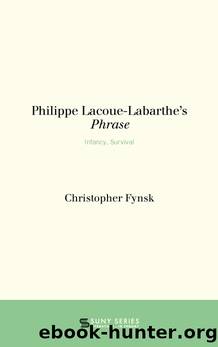Philippe Lacoue-Labarthe's Phrase by Christopher Fynsk

Author:Christopher Fynsk
Language: eng
Format: epub
Publisher: State University of New York Press
Published: 2016-07-14T16:00:00+00:00
In Phrase XX, we will encounter a comparable, but more severe, juxtaposition of flight and infirmity with an anxious but uncompromising demand for answers. In this last segment, the deterioration has advanced to a terrifying degree. The first two sections of it give testimony to an extreme separation from self, a disappropriation, disaggregation, and abjection that find a kind of echo, in turn, in the division of the other’s voice, though here an acerbic demand (for answers, for justice) cohabits with a voice that is musical, disarmed, almost childlike. That the afflicted writer of this section can even hear the loving voice and recognize the grace of gesture is astounding, so great have the poisoning infirmity and the uncanny separation become. These are clearly dying notes, and yet the exposure somehow remains no matter how arid the relation has become.
But another note, another exigency, sounds from the divergence that I have perhaps too delicately evoked here.38 In Phrase XII, her “refutations” become a demand for a just recognition of her presence and what speaks in her heart. This latter demand, however, even more strident and desperate in Phrase XX, is still not quite what we hear in the last verses of the same Phrase XII, where an unattributed voice calls for an unattainable probity in a citation from the Requiem Mass:
I will sing Quidquid latet apparebit as no one
Has ever sung it, in vain. And no one, believe me, no one
Will have the uprightness required to hear it, ever. (P, 80)39
Was this apocalyptic tone latent in her apprehensive appeal to judgment, or was it called forth by his guilt and shame in such a way that it carries to an absolute what he hears in her judgments and demand for justice? Once again, though it follows a sequence of demands whose justice seems irrefutable (they are the demands of a lover who calls for what has been promised, and in sheer exposure), and then a more severe, more exposing challenge, the appeal to the Quidquid latet apparebit does not appear to be in her voice.
There had been already an appeal to justice in language in the idyllic period in Alsace evoked in Phrase IV.
We had spoken of things
still to be born and of those we thought
would never again see the day. Of the precision
of our language too, when it deplores or sets itself
against the already said and against the unnamed.
Of the wanting and of the just place of words. (P, 38)
But the struggle for truth named here, even the implicit judgment regarding a failing they inevitably shared (which will be repeated in Phrase XIX), does not point to “the storm of a sanction” (P, 81) or the absolute of the citation from the Requiem Mass. A different order of judgment has been sounded in that citation, just as it is a different meaning of justice that has been evoked. The latter, if not the former, points us toward the implicit condemnation that comes via “The Dead” in Phrase X. Here,
Download
This site does not store any files on its server. We only index and link to content provided by other sites. Please contact the content providers to delete copyright contents if any and email us, we'll remove relevant links or contents immediately.
| African | Asian |
| Australian & Oceanian | Canadian |
| Caribbean & Latin American | European |
| Jewish | Middle Eastern |
| Russian | United States |
4 3 2 1: A Novel by Paul Auster(12393)
The handmaid's tale by Margaret Atwood(7767)
Giovanni's Room by James Baldwin(7346)
Asking the Right Questions: A Guide to Critical Thinking by M. Neil Browne & Stuart M. Keeley(5775)
Big Magic: Creative Living Beyond Fear by Elizabeth Gilbert(5774)
Ego Is the Enemy by Ryan Holiday(5450)
The Body: A Guide for Occupants by Bill Bryson(5097)
On Writing A Memoir of the Craft by Stephen King(4944)
Ken Follett - World without end by Ken Follett(4734)
Adulting by Kelly Williams Brown(4574)
Bluets by Maggie Nelson(4559)
Eat That Frog! by Brian Tracy(4540)
Guilty Pleasures by Laurell K Hamilton(4450)
The Poetry of Pablo Neruda by Pablo Neruda(4109)
Alive: The Story of the Andes Survivors by Piers Paul Read(4033)
White Noise - A Novel by Don DeLillo(4012)
Fingerprints of the Gods by Graham Hancock(4004)
The Book of Joy by Dalai Lama(3986)
The Bookshop by Penelope Fitzgerald(3854)
